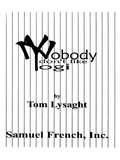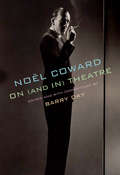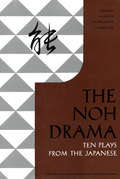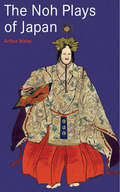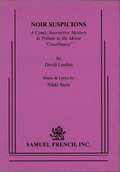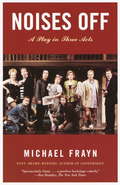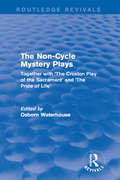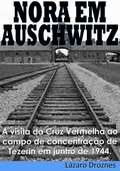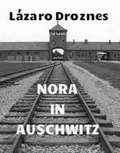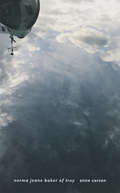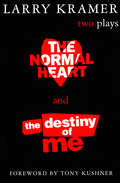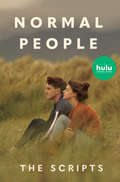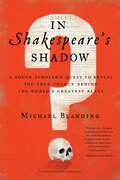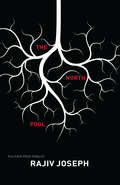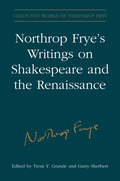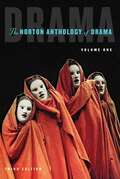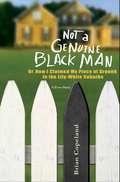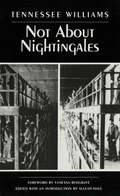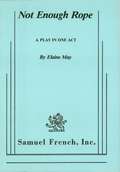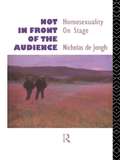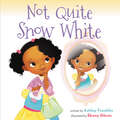- Table View
- List View
Nobody Don't Like Yogi
by Tom LysaghtBiographical Comedy / 1m / Interior / In 1985, 16 games into the season, George Steinbrenner fired Yankee manager Yogi Berra, and he insulted the Berra family. Yogi never told anyone what was said, but he vowed not to enter Yankee Stadium as long as Steinbrenner owned the team. And he didn't until 1999 when the ghosts of Yankee greats tugged at his heart and he returned to throw out the first pitch of the season, replacing the recently deceased Joe DiMaggio. Set in the clubhouse of the cathedral of baseball, this play recreates that day and shows why Yogi Berra is a national treasure and a New York icon. Ben Gazzara starred in New York. / "A home run.''-New York Post
Noël Coward on (and in) Theatre
by Noël CowardNoël Coward on theatre was as dazzling and entertaining as his masterful plays and lyrics. Here his ideas and opinions on the subject are brilliantly brought together in an extraordinary collection of commentary, lyrics, essays, and asides on everything having to do with the theatre and Coward's dazzling life in it.The book Noël Coward wanted, promised, threatened to write—and never did. Including essays, interviews, diary entries, verse, his views on his fellow playwrights: "My Colleague Will," Shaw, Wilde, Chekhov, Barrie, Maugham, Eliot, Osborne, Albee, Beckett, Miller, Williams, Rattigan, Pinter, and Shaffer. Coward on the critics—many of whom irritated him over the years but came to admire him: James Agate, Alexander Woollcott, Graham Greene, Kenneth Tynan among them. And on the plays he wrote, among them: The Vortex; Hay Fever; Private Lives; Design For Living; Blithe Spirit.Here is the Master on the producers who crossed his path: André Charlot, C. B. Cochran, Binkie Beaumont. And the actors in the Coward galaxy: John Gielgud, Laurence Olivier, Gertrude Lawrence, the Lunts, etc. . . . His views on the art of acting: auditions, rehearsals, learning the lines, clarity of delivery, timing, control, range, stage fright, fans, theater audiences, revivals, comedy, "the Method," plays with a "message," taste, construction, "Star Quality," etc. . . . And last, but Noël Coward least, his experience in, and thoughts on: revue, cabaret, television, and musical theater, Bitter Sweet, Conversation Piece, Pacific 1860, After the Ball, Ace of Clubs, Sail Away, The Girl Who Came to Supper, Words and Music, This Year of Grace, London Calling! . . . and much more. Ingeniously, deftly compiled, edited, and annotated by Barry Day, Coward authority and editor of The Noёl Coward Reader and The Letters of Noёl Coward.
The Noh Drama: Ten Plays from the Japanese (Unesco collection of representative works)
by Noh CommitteeThis classic of Japanese studies presents extensive information about the history, culture and practice of Noh drama--one of Japan's most treasured dramatic art forms.<P><P>Noh as an independent and original art form--ultimately destined to supersede the earlier Dengaku, Sarugaku and other song dances--incorporates the most significant elements of the former and especially of the Kusemai (tune dance).With it a new literary form may be said to have been created.The invention of Noh is attributed to Kwannami Kiyotsugu (1333-1384), a distinguished actor and writer of Sarugaku and to his son Zeami Motokiyo (1363-1443), who developed and refined the art under the patronage of Yoshimitsu, the third Ashikaga shogun. In addition to his dramatic activities, Zeami composed a number of works, the most important of which is called the Kwadensho (the Book of the Flower), or more properly, Fushi-kwadensho which he explained the nature and aesthetic principles governing Noh plays, and gave detailed instructions concerning the manner of composition, acting, direction, and production of these dramas.Combining the elements of dance, miming, music, and chants, Noh plays may be described as lyrico-dramatic tone-poems, in which the text has a function somewhat similar to that of the libretto in a Wagner or Debussy opera.
The Noh Plays of Japan
by Arthur WaleyFirst published in 1921, The Noh Plays of Japan has been justly famous for more than three-quarters of a century and established the Noh play for the Western reader as beautiful literature. It contains translations of nineteen plays and summaries of sixteen more.
The Noh Plays of Japan
by Arthur WaleyFirst published in 1921, The Noh Plays of Japan has been justly famous for more than three-quarters of a century and established the Noh play for the Western reader as beautiful literature. It contains translations of nineteen plays and summaries of sixteen more.
Noir Suspicions
by David Landau Nikki SternMystery / 4m, 3f / In this hard boiled comic mystery sequel to the ever-popular Murder at Cafe Noir, ex-private eye Nick Archer is now the confused manager of Cafe Noir on the island of Mustique. He is confronted with a corpse on the dock, a mysterious femme fatale, a French blackmailer and a businessman who wants both the cafe and the woman. Rick is arrested after the blackmailer is murdered in his club. It is up to the audience to convince the magistrate that he is innocence. A tribute to Casablanca with many references to the classic movie, Noir Suspicions is guaranteed to delight audiences whether or not they are familiar with Murder at Cafe Noir
Noises Off: A Play in Three Acts
by Michael FraynNoises Off is not one play but two - simultaneously a traditional sex farce, Nothing On, and the backstage farce that develops during Nothing On's final rehearsal and tour. The two farces begin to interlock, as the characters make their exits from Nothing On only to find themselves making entrances into the even worse nightmare going on backstage, and exit from that only to make their entrances back into Nothing On. In the end, at the disastrous final performance in Stockton-on-Tees, the two farces can be kept separate no longer, and coalesce into one single collective nervous breakdown. Noises Off won both the Evening Standard and the Olivier Awards for Best Comedy when it was first produced, and ran in the West End for nearly five years. Michael Frayn's most recent play, Copenhagen, won both the Evening Standard Best Play Award in London and the Tony Best Play Award in New York.
The Non-Cycle Mystery Plays: Together with 'The Croxton Play of the Sacrament' and 'The Pride of Life' (Routledge Revivals)
by Osborn WaterhouseBetween the beginning of the tenth and the end of the sixteenth centuries, in all parts of Great Britain from Aberdeen to Cornwall, performances of liturgical and mystery plays are on record. This book, first published in 1909, is a collection of early-English religious plays with a detailed introduction written by the editor Osborn Waterhouse. The Non-Cycle Mystery Plays will be of interest to students of drama, performance and theatre studies.
Nonsense and Meaning in Ancient Greek Comedy
by Stephen E. KiddThis book examines the concept of 'nonsense' in ancient Greek thought and uses it to explore the comedies of the fifth and fourth centuries BCE. If 'nonsense' (phluaria, lēros) is a type of language felt to be unworthy of interpretation, it can help to define certain aspects of comedy that have proved difficult to grasp. Not least is the recurrent perception that although the comic genre can be meaningful (i. e. contain political opinions, moral sentiments and aesthetic tastes), some of it is just 'foolery' or 'fun'. But what exactly is this 'foolery', this part of comedy which allegedly lies beyond the scope of serious interpretation? The answer is to be found in the concept of 'nonsense': by examining the ways in which comedy does not mean, the genre's relationship to serious meaning (whether it be political, aesthetic, or moral) can be viewed in a clearer light.
Nora Em Auschwitz
by Lázaro Droznes Anabela Alves Lopes Afonso Romão PintoEste drama ficcional relata o processo de ensaios da CASA DE BONECAS de Ibsen, para ser representada em junho de 1944, quando uma delegação da Cruz Vermelha Internacional visitou o campo de concentração de Tezerin, a fim de verificar em que condições viviam os judeus. A atriz que antes fazia o papel de Nora foi transferida para Este e a obra reflete as dificuldades que a sua substituta, recém-chegada a Tezerin, enfrenta. Durante a visita da Cruz Vermelha, o campo transformou-se num grande palco de teatro no qual milhares de pessoas representaram diversas cenas para impressionar favoravelmente os delegados.
Nora in Auschwitz
by Luigia Pantalea Rovito Lázaro DroznesQuesta finzione drammatica racconta le prove per CASA DI BAMBOLA di Ibsen, la cui rappresentazione fu organizzata quando, nel mese di luglio del 1944, una delegazione della Croce Rossa Internazionale si recò in visita al campo di concentramento di Terezin con lo scopo di verificare le condizioni di vita degli ebrei. L'attrice inizialmente impegnata nel ruolo di Nora era stata deportata all'Est, e l'opera riflette le difficoltà incontrate dalla sua sostituta, arrivata di recente a Terezin. Durante la visita della Croce Rossa, il campo venne trasformato in un enorme palcoscenico, sul quale migliaia di persone diedero vita a numerosi spettacoli per impressionare favorevolmente i delegati.
Norma Jeane Baker of Troy (Oberon Modern Plays Ser.)
by Anne CarsonAnne Carson’s new work that reconsiders the stories of two iconic women—Marilyn Monroe and Helen of Troy—from their point of view Norma Jeane Baker of Troy is a meditation on the destabilizing and destructive power of beauty, drawing together Helen of Troy and Marilyn Monroe, twin avatars of female fascination separated by millennia but united in mythopoeic force. Norma Jeane Baker was staged in the spring of 2019 at The Shed’s Griffin Theater in New York, starring actor Ben Whishaw and soprano Renée Fleming and directed by Katie Mitchell.
The Normal Heart and The Destiny of Me: Two Plays
by Larry Kramer Tony KushnerThe Normal Heart, set during the early years of the AIDS epidemic, is the impassioned indictment of a society that allowed the plague to happen, a moving denunciation of the ignorance and fear that helped kill an entire generation. It has been produced and taught all over the world. Its companion play, The Destiny of Me is the stirring story of an AIDS activist forced to put his life in the hands of the very doctor he has been denouncing.
Normal People: The Scripts
by Sally RooneyDelve deeper into the Emmy- and Golden Globe–nominated Hulu series based on Sally Rooney's bestselling novel with this must-have collection of the Normal People scripts, featuring behind-the-scenes photos and an introduction by director Lenny Abrahamson.&“You know, I did used to think that I could read your mind at times.&”&“In bed you mean.&”&“Yeah. And afterwards but I dunno maybe that's normal.&”&“It&’s not.&”Connell and Marianne grow up in the same small town in the west of Ireland, but the similarities end there. In school, Connell is popular. Marianne is a loner. But when the two strike up a conversation, something life-changing begins.With an introduction by director Lenny Abrahamson and featuring iconic images from the show, Normal People: The Scripts contains the complete screenplays of the acclaimed Emmy- and Golden Globe–nominated television drama that The New York Times called &“an unusually thoughtful and moving depiction of young people&’s emotional lives.&”
North by Shakespeare: A Rogue Scholar's Quest for the Truth Behind the Bard's Work
by Michael BlandingThe true story of a self-taught Shakespeare sleuth&’s quest to prove his eye-opening theory about the source of the world&’s most famous plays, taking readers inside the vibrant era of Elizabethan England as well as the contemporary scene of Shakespeare scholars and obsessives.Acclaimed author of The Map Thief, Michael Blanding presents the twinning narratives of renegade scholar Dennis McCarthy, called &“the Steve Jobs of the Shakespeare community,&” and Sir Thomas North, an Elizabethan courtier whom McCarthy believes to be the undiscovered source for Shakespeare&’s plays. For the last fifteen years, McCarthy has obsessively pursued the true origins of Shakespeare&’s works. Using plagiarism software, he has found direct links between Hamlet, Macbeth, Romeo and Juliet, and other plays and North&’s published and unpublished writings—as well as Shakespearean plotlines seemingly lifted straight from North&’s colorful life.Unlike those who believe someone else secretly wrote Shakespeare, McCarthy&’s wholly original conclusion is this: Shakespeare wrote the plays, but he adapted them from source plays written by North decades before. Many of them, he believes, were penned on behalf of North&’s patron Robert Dudley, in his efforts to woo Queen Elizabeth. That bold theory addresses many lingering mysteries about the Bard with compelling new evidence, including a newly discovered journal of North&’s travels through France and Italy, filled with locations and details appearing in Shakespeare&’s plays.North by Shakespeare alternates between the enigmatic life of Thomas North, the intrigues of the Tudor court, the rivalries of English Renaissance theater, and academic outsider Dennis McCarthy&’s attempts to air his provocative ideas in the clubby world of Shakespearean scholarship. Through it all, Blanding employs his keen journalistic eye to craft a captivating drama, upending our understanding of the beloved playwright and his &“singular genius.&”
The North Pool
by Rajiv JosephKhadim has no idea why he's been called into the office of Dr. Danielson, the Vice Principal at Sheffield High. At first, Danielson is cagey, using a minor violation to keep the boy at school for detention. But as tension mounts, Danielson alternately plays good cop and bad, and winds up catching Khadim in a series of lies about crimes he may (or may not) have committed.The truth shifts constantly in this riveting cat-and-mouse thriller from Pulitzer Prize finalist Rajiv Joseph. What's bothering Dr. Danielson? What are the secrets that trouble Khadim? As the semester reaches its final hour, the time for revelation begins. The North Pool is a psychological drama that weaves a timely character study about racial and cultural profiling in America, skillfully using an interrogation to peel away ever more unexpected layers of the characters' lives as they navigate our increasingly complex society.
Northrop Frye On Shakespeare
by Northrop FryeCriticism and interpretation of Romeo and Juliet, A Midsummer Night's Dream, Richard III, Henry IV, Hamlet, King Lear, Antony and Cleopatra, Measure for Measure, The Winter's Tale, and The Tempest.
Northrop Frye's Writings on Shakespeare and the Renaissance (Collected Works of Northrop Frye #28)
by Northrop Frye Troni Y. Grande Garry SherbertThis collection of Northrop Frye's writings on Shakespeare and the Renaissance spans forty years of his career as a university teacher, public critic, and major theorist of literature and its cultural functions. Extensive annotations and an in-depth critical introduction demonstrate Frye's wide-ranging knowledge of Renaissance culture, the pivotal place of the Renaissance in his oeuvre, his impact on Renaissance criticism and on the Stratford Festival, and his continuing importance as a literary theorist.This volume brings together Frye's extensive writings on Shakespeare and other Renaissance writers (excluding Milton, who is featured in other volumes), and includes major articles, introductions, public lectures, and four previously published books on Shakespeare. Frye's insightful analyses offer not just a formidable knowledge of Renaissance culture but also a transformative experience, moving the reader imaginatively towards an experience of created reality.
The Norton Anthology of Drama
by J. Ellen Gainor Stanton B. Garner Martin PuchnerComprehensive and up-to-date, now with more instructor resources <p><p>Choose from the most comprehensive collection of plays. Enjoy accessible apparatus that helps students better analyze the works. Savor an eye-catching and informative illustration program focusing on performance.
Not a Genuine Black Man: Or, How I Claimed My Piece of Ground in the Lily-White Suburbs
by Brian CopelandBased on the longest-running one-man show in San Francisco history--now coming to Off-Broadway--a hilarious, poignant, and disarming memoir of growing up black in an all-white suburb In 1972, when Brian Copeland was eight, his family moved from Oakland to San Leandro, California, hoping for a better life. At the time, San Leandro was 99.4 percent white, known nationwide as a racist enclave. This reputation was confirmed almost immediately: Brian got his first look at the inside of a cop car, for being a black kid walking to the park with a baseball bat. Brian grew up to be a successful comedian and radio talk show host, but racism reemerged as an issue--only in reverse--when he received an anonymous letter: "As an African American, I am disgusted every time I hear your voice because YOU are not a genuine Black man!" That letter inspired Copeland to revisit his difficult childhood, resulting in a hit one-man show that has been running for nearly two years--which has now inspired a book. In this funny, surprising, and ultimately moving memoir, Copeland shows exactly how our surroundings make us who we are.
Not About Nightingales
by Tennessee WilliamsThis early full-length play put a young Tennessee Williams' passion for social justice in the spotlight. "Haunting, searing, unforgettable" —London Herald In early 1998, sixty years after it was written, one of Tennessee Williams' first full-length plays, Not About Nightingales, was premiered by Britain's Royal National Theatre and was immediately hailed as "one of the most remarkable theatrical discoveries of the last quarter century (London Evening Standard). Brought to the attention of the director Trevor Nunn by the actress Vanessa Redgrave (who has contributed a Foreword to this edition), "this early work...changed our perception of a major writer and still packs a hefty political punch" (London Independent). Written in 1938 and based on an actual newspaper story, the play follows the events of a prison atrocity which shocked the nation: convicts leading a hunger strike in a Pennsylvania prison were locked in a steam-heated cell and roasted to death. Williams later said: "I have never written anything since that could compete with it in violence and horror." Its sympathetic treatment of black and homosexual characters may have kept the play unproduced in its own time. But its flashes of lyricism and compelling dialogue presage the great plays Williams has yet to write. Not About Nightingales shows us the young playwright (for the first time using his signature "Tennessee") as a political writer, passionate about social injustice, and reflecting the plight of outcasts in Depression America. The stylistic influences of European Expressionism, radical American theatre of the 1930s, and popular film make it unique among the group of four early plays. Not About Nightingales has been edited by eminent Williams scholar Allean Hale, who has also provided an illuminating historical introduction.
Not Enough Rope
by Elaine MayFarce / 1m, 2f / Interior / In a rooming house, a young man is unpacking when in walks a young lady looking for rope. She wants to hang herself. Well, the man hasn't any, but has some twine; so in desperate seriousness, they barter. Finally she takes the twine to her room, puts on the phonograph, and prepares to hang herself; while he unpacks. The first effort fails, but the second is succeeding nicely, when suddenly the record stops. She tries to get down to fix the phonograph, but can't. And both the young man and the doddering old lady who wheels herself into view will not lend a hand to help her. It's only because he decides to move out of this crazy place, and needs the twine to pack, that the girl finally is freed.
Not in Front of the Audience: Homosexuality On Stage
by Nicholas de JonghFirst published in 1992. Routledge is an imprint of Taylor & Francis, an informa company.
Not Quite Snow White
by Ashley FranklinA picture book for magical yet imperfect children everywhere, written by debut author Ashley Franklin and perfect for fans of such titles as Matthew A. Cherry's Hair Love, Grace Byers's I Am Enough, and Lupita Nyong'o's Sulwe.Tameika is a girl who belongs on the stage. She loves to act, sing, and dance—and she’s pretty good at it, too. So when her school announces their Snow White musical, Tameika auditions for the lead princess role.But the other kids think she’s “not quite” right to play the role. They whisper, they snicker, and they glare.Will Tameika let their harsh words be her final curtain call?Not Quite Snow White is a delightful and inspiring picture book that highlights the importance of self-confidence while taking an earnest look at what happens when that confidence is shaken or lost. Tameika encourages us all to let our magic shine.
Not Since Carrie: Forty Years of Broadway Musical Flops
by Ken MandelbaumIf you love Broadway musicals, this book is for you. While Broadway has had its share of musical triumphs, it has also seen hundreds of musicals that had brief runs, lost millions of dollars, and broke the hearts of their creators and performers. For every hit musical, there are roughly five others that are quick flops, and even the most celebrated names in show business are not immune to them. Ken Mandelbaum offers the behind-the-scenes story of the development of almost two hundred musical flops that played Broadway between 1950 and 1990, along with a reevaluative and often revisionist study of their quality. Here they all are, from such legendary catastrophes as Carrie, Kelly, Breakfast at Tiffany’s, and Legs Diamond, to flops that starred Lucille Ball and Bette Davis, to the failures of Rodgers and Hammerstein, Jule Styne, Jerry Herman, Alan Jay Lerner, Gower Champion, and many others. Not Since Carrie makes a case for the strengths of certain unsuccessful works, points out some that might be worthy of revival, and allows the reader to relive some of Broadway’s most infamous moments. A reexamination of neglected, forgotten, and often catastrophic musicals, Not Since Carrie will remain the definitive volume on a colorful and vital segment of "lost” theatre history. Ken Mandelbaum has written on musical theatre for The New York Times, Playbill, Stagebill, Billboard, Show Music, and Sony/Columbia Records. He is currently the musical theatre critic for Theater Week magazine. In 1989, he won acclaim for his first book, A Chorus Line and the Musicals of Michael Bennett (St. Martin’s Press). He lives in New York City, and his favorite song is "I Wish It So” from the flop Juno. If you subscribe to a music service like Amazon or Spotify, you can listen to many of the songs described. At the end of the book there is a Shows Index and a Names Index.
